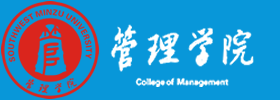国际交流
Introduction to the College ofManagement
Themanagement education of Southwest Minzu University originates from the the1950s Southwest Institute for Nationalities, and in 2003 officially changed itsname to Management College.
Thecollege of Management, with the mission of "giving management knowledgeand cultivating national talents", in accordance with the goal of "characteristic, high leveluniversity", striving for "characteristic, high level managementCollege". The college of management focuses on the direction of thesubject, improves the quality ofpersonnel training systematically, and promotes the all-round development ofstudents which has become an important base forthe high-level management personnel training and scientific research inthe western region.
Thereare 84 full-time teachers in the college, including 12 professors, 32 associateprofessors, more than 50 Ph. D and postgraduate tutors, 2 outstanding expertswith outstanding contributions to Sichuan province, 1 academic and technicalleader for Sichuan province, 4 reservecandidates for academic and technical leaders and 3young and middle-aged talents of StateEthnic Affairs Commission. The school of Management engages a group of experts,scholars and entrepreneurs as visiting professors such as Li Jingwen, theacademician and board member of the Chinese Academy of Social Sciences.
The Institute has 3 first-levelmaster's authorization points in management science and engineering, businessadministration and public administration, respectively approved by the StateCouncil degree office in 2003, 2011 and 2011.
Management science and engineering first-levelsubject authorization point has a clear traininggoal, scientific and reasonable positioning , always striving to enhance the comprehensivestrength of professional research , taking the Western ethnic areas of socialand economic development of the actual demand as the starting point, focusing onthe subject of concise, prominent academic research characteristics which hasachieved remarkable results. There are 9 existing tutors in this discipline,including 7 teachers with Ph. D. degrees, three of them are professors. Thereare 6 graduate students in the school at present.
Business Administration first-levelDiscipline authorization point upholds the"Two Fors" purpose ofrunning schools, mainly to meet the needs of all ethnic groups students tofurther the business administration of the first degree study , as well as tomeet the demands of industrial andcommercial enterprises, government economic management departments,universities and scientific research institutes in southwest ethnic areas toresearch on business management theory, management practice and teaching andresearch personnel. It focuses on cultivating the business managementhigh-level research and management personnel featuring "eligible, useful, reliable, faithful",so as to provide intellectual support in the field of business management foreconomic and social development in the western ethnic areas. The discipline has20 postgraduate guidance teachers ,including 10 professors, 10 teachers with doctoral degree. There are 16graduate students in school currently.
Thefirst-level of Public Administration discipline authorization point upholds the“ Two Fors” purpose ofrunning schools and adheres to the principle of equal emphasis on theory andpractice, closely combined with the academic and practical nature of the major,the main training purpose is to cultivate the high-level research andmanagement personnel featuring"eligible, useful, reliable, faithful" for the Government andits public administration departments in China's western ethnic areas. This disciplinehas 40 postgraduate guidance teachers. There are 159 graduate students in the school currently.
Thecollege's existing Master of Business Administration (MBA), Master of PublicAdministration (MPA), Master of Accounting (MPACC), Master of Agriculture(agricultural Development), Master of Education (education Management) andother 5 professional degree categories (field), respectively in 2007, 2011,2015, 2012, 2018 have been approved by the State Council degree office tobecome a training unit.
MBA education mainly meets the needsof various nationalities to have the compound and innovative high-level managementtalents, and to train the multinational MBA as its duty, so as to cultivate thefuture entrepreneur and professional manager with a global perspective withmany nationalities. The discipline has33 full-time teachers, including 13 professors,15 associate professors , 18 PhDteachers , and 3 postdoctoral . Thereare 150 postgraduate students in the school now.
MPA education insists on the road of"scientific development, connotation development and characteristicdevelopment", and makes great efforts to create the MPA as the "cradle of public management talents inthe Western minority areas", and has formed the concept of MPA running"for minority nationalities, facing ethnic areas and developing for thefuture". The discipline has 39 full-time teachers and 26 PhD teachers.There are 54 postgraduate students in the school.
MPACC uphold the school's "Two Fors" schoolpurposes, continuing the mission of the School of Management of "givingmanagement knowledge, cultivating national talents", with the mission of"providing financial knowledge, educating national talents", to"become the unique and highly competitive accounting talent training basein the western region" as the project vision.The discipline has 25full-time teachers, including 7 professors, 12 associate professors and 15 PhDteachers. There are 89 postgraduate students in the school.
The Management College now has 8 undergraduate majors such as accounting (1994), FinancialManagement (1995), Business Administration (1997), Human Resources Management(2002), Marketing (1996), Administration (1998), Public Service Management(2006) and Logistics Management (2014).
The Management College has key research base ofphilosophy and social science of Universities of Sichuan Province, namely the SichuanNational Education Development Research Center; and 8 school-level researchinstitutions, 1 provincial practiceeducation base.
|

